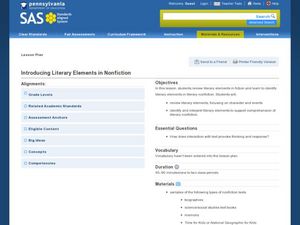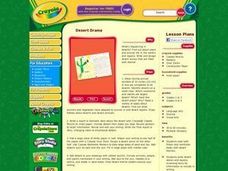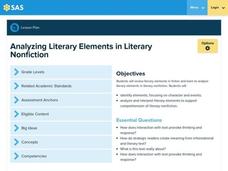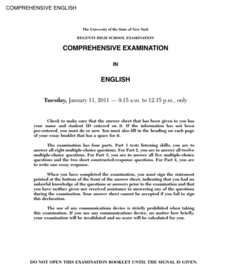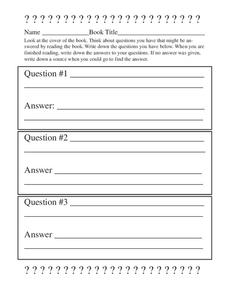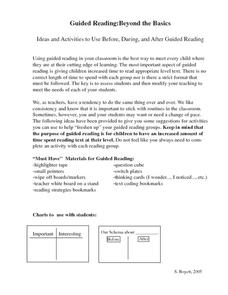Curated OER
An Introduction to Nonfiction
Examine the elements of nonfiction writings in this lesson. Learners list common features of nonfiction and compare nonfiction and fiction books on the same topic. Create a Venn diagram comparing and contrasting the two genres.
Curated OER
Introducing Literacy Elements in Nonfiction
Explore nonfiction writing with your class. They will identify elements in nonfiction by reviewing elements of fiction. Then they use biographies, memoirs, menus, Time for Kids, and text books to identify elements of nonfiction. They...
Pennsylvania Department of Education
Exploring Key Ideas and Details in Fiction and Nonfiction
Third graders participate in activities to differentiate fiction from nonfiction. For this fiction lesson, 3rd graders describe the elements of a fiction story. Students compare and contrast fiction and non fiction elements. Students...
Curated OER
Text Elements of Fiction and Nonfiction
Second graders examine the text elements associated with fiction and nonfiction texts. In this text elements lesson, 2nd graders listen to Anansi and the Moss Covered Rock by Eric A. Kimmel. They take formative assessments to determine...
Mark Twain Media
Understanding Informational Text Features
Everything you need to know about informational text features can be found in this resource. Recognizing these types of text features and how they are used in text allows readers to better understand information. Teachers can use this as...
Curated OER
When I Set My Hat at a Certain Angle: Trying on Zora Neale Hurston's Voice to Dress-up Prose
After reading and evaluating examples of prose nonfiction by Zora Neale Hurston and other authors, high schoolers write a personal reflective essay rich in figurative language. By incorporating this strategy, they utilize voice within...
Curated OER
Analyzing the Use of Irony in a Short Story
Ninth graders examine how literature connects to real-life and see how irony aids in the development of theme. They read Shirley Jackson's The Lottery, and discuss elements of foreshadowing and situational irony. Then learners will write...
Curated OER
Desert Drama
Young scholars read both fiction and nonfiction books with desert themes. Then they write desert stories and reports, reviewing texts for information to include in writing. Students also design desert scenes with details and setting...
Pennsylvania Department of Education
Analyzing Literary Elements in Literary Nonfiction
Fourth graders identify the literary elements of a nonfiction text. For this literary elements lesson, 4th graders read the text Piano Starts Here--The Young Art Tatum and fill in a chart that includes the events from the book....
Curated OER
Fiction vs. Nonfiction
Students explore fiction and nonfiction writing. They identify the elements of fiction in a short story and identify the criteria necessary in a nonfiction piece. Students distinguish the author's purpose in an expository text,...
Curated OER
Symbols and the Choices we Make
Upper elementary and middle schoolers recognize symbols that influence the choices that we make consciously or unconsciously in everyday life. They look at the symbols and choices that others make. They identify and apply knowledge of...
Scholastic
Comprehension During Independent Reading
Ideal for a language arts class, literary unit, or independent reading assignment, a set of reading worksheets address a wide array of skills. From poetic elements to nonfiction text features, you can surely find a valuable resource in...
Houghton Mifflin Harcourt
Alexander Graham Bell
Study the features of nonfiction text with a set of comprehension and analysis materials. Readers learn about Alexander Graham Bell with questions about the text, writing prompts, and proofreading activities.
New York State Education Department
Comprehensive English Examination: January 2011
Scholars read an excerpt from the short story "The Bonfire" by Kunikida Doppo as well as a nonfiction passage about handcycling. Next, they answer comprehension-based multiple-choice questions. Additionally, they respond to short-answer...
Curated OER
Lesson Six: Nonfiction Text Elements (Part One)
Students examine nonfiction text elements in preparation for writing a nonfiction book about Lewis and Clark. In this social studies/language arts lesson, students discuss the term research and complete a cluster map. Additionally,...
Curated OER
Comparing Fiction and Nonfiction
Fifth graders compare and contrast an informational article with a fictional story. They read the story "The Contest" as a class, and discuss the different types of literature genres. Next, they complete a vocabulary worksheet and a...
Ideas From Suzi
Responding to Literature
Guide your class through a text with resources for before and after reading. Learners ask questions, discuss characters and plot points, point out elements of the reading that stood out, and compose brief summaries.
Curated OER
Analyzing Irony in Nonfiction
Students examine the use of irony in non-fiction works. In this literature lesson, students read non-fiction war texts and explore the use of irony in the piece as they respond to discussion questions.
Curated OER
Blending Fiction and Nonfiction to Improve Comprehension and Writing Skills
Pupils explore a content area by reading both fiction and nonfiction texts on the topic. They do more research online about the topic. After comparing the texts, they create their own written original work, using both narrative and...
Great Schools
Different Types of Writing
What type of writing is this? Learners read a brief introduction to various types of text: instructions, explanations, poems, folk tales, novels, informative, and arguments. The introduction doesn't explain these, so consider going over...
Curated OER
The Effects of Slavery
The emotional and spiritual oppression of slavery in the African-American experience is the focus of this instructional activity. Middle schoolers analyze various texts by Frederick Douglass and Maya Angelou related to freedom and...
Curated OER
Non-Fiction Books
A well-designed presentation on non-fiction books awaits your young readers. They discover the features of a non-fiction book, and are shown the elements of a non-fiction book such as, the table of contents, the glossary, an index, and...
Ideas From Suzi
Guided Reading: Beyond the Basics
Elevate children's reading comprehension skills with this collection of guided reading resources. From paper dice with basic comprehension questions printed on them to a system for using sticky notes to identify key parts of a story,...
American Press Institute
In the Newsroom: The Fairness Formula
Reporting the news is easy, right? Think again! Show young scholars the difficult choices journalists make every day through a lesson that includes reading, writing, and discussion elements. Individuals compare the language and sources...



